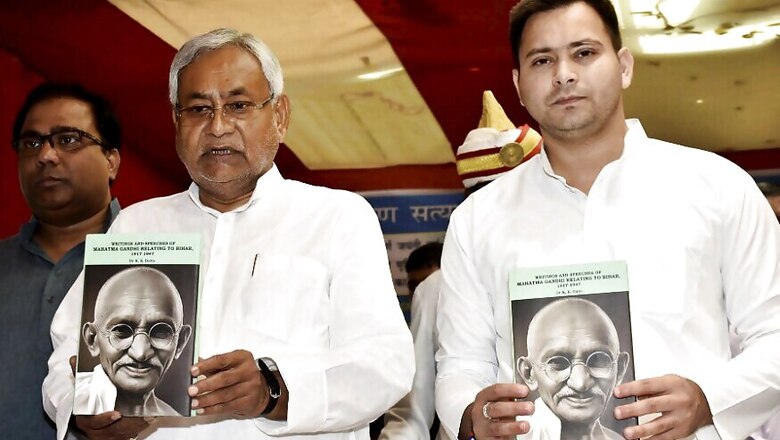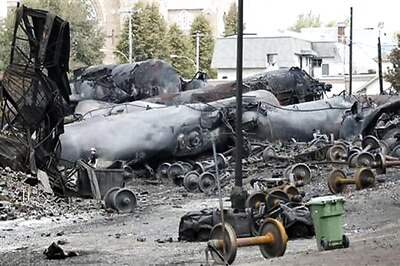
views
Patna: Branded as the party of Muslims and Yadavs, the Rashtriya Janata Dal (RJD) has begun an exercise to get an image makeover and become acceptable to all sections of society including the upper castes, which it attacked in the past to consolidate the preponderant backward sections of Bihar in its favour.
In a paradigm shift in its social philosophy, RJD leader Tejashwi Yadav has floated the ‘A to Z’ principle encompassing every section of society, deviating from the core formula of Muslim-Yadav (M-Y) devised by his father and party supremo Lalu Prasad in the early 1990s.
“The RJD is not an M-Y party alone. Its base is much bigger and it belongs to people from A to Z. Ours is a big family in which we respect every section of society and give everyone adequate representation,” Tejashwi said while addressing a recent meeting of newly-appointed district presidents and secretary generals of the party.
The RJD has been vigorously pursuing the M-Y formula in the distribution of tickets in the Lok Sabha and state assembly elections, selection of prospective candidates for Legislative Council and Rajya Sabha polls, and appointment of office-bearers, leaving very few seats for other castes.
The M-Y formula was carefully crafted by Lalu Prasad in a bid to consolidate the significant Muslim-and-Yadav vote bank in his favour in Bihar. The Muslims constitute around 18% and the Yadavs 12% of the population in Bihar. Not surprisingly then, with nearly 30% of the vote base in his kitty, the RJD supremo had comfortably won successive elections and ruled the state for 15 years till early 2005.
At the national level, the backward sections are clubbed as Other Backward Classes (OBCs). But in Bihar, they are divided into two sections – the Extremely Backward Classes (EBCs) categorised officially as Annexure 1 and the Backward Classes (BCs) categorised as Annexure 2.
While the Annexure 1 category has 120-odd castes, the Annexure 2 segment has four— the Yadavs, Kurmis, Koeris (Kushwahas) and Vaishyas (Banias). The Scheduled Caste category has altogether 22 castes while the tribesmen account for nearly one per cent of the population limited only to some areas bordering Jharkhand and Nepal.
The backward consolidation reached its zenith in the early 1990s when the-then VP Singh government at the Centre announced the implementation of the Mandal Commission recommendations for 50 per cent quota for them in government jobs. Lalu Prasad, who was chief minister of Bihar at the time, took full advantage of it and won successive elections till he was dethroned after filing of a chargesheet against him in the multi-crore fodder scam.
But political ambitions of the deprived non-Yadav castes among the backward community grew over the years and they started rallying behind Nitish Kumar, who had deserted the-then Janata Dal and formed the Samata Party, which later transformed into the present Janata Dal (United). Nitish also roped in a majority of the sub-groups among the Dalits by bracketing them as ‘Mahadalits’ and launching welfare measures for them.
Three major castes of the Backward Classes (BCs) in Bihar – the Kurmis, Koeris and Vaishyas – besides the EBCs, SCs and STs had gradually started distancing from the RJD due to the party’s focus on the M-Y formula. A substantial number of these caste groups had switched over to other outfits like the JD(U), Lok Janshakti Party (LJP) and other small caste-based parties.
Cracking the caste code is a must to win elections anywhere in the country but nowhere is it more pronounced than in Bihar where the mantra for all political parties is ‘social engineering’ – an exercise of striking a caste balance. Under the garb of ‘development politics’, they carry forward the ‘caste only baggage’ and walk the extra mile to resort to last-minute permutations and combinations based on constituency-wise caste equations in the selection of candidates.
Having suffered electoral losses since 2005, the RJD has now planned to expand its social ambit by bringing back its lost base among the EBCs and Dalits by choosing 45% of its office-bearers from them. Candidates for the assembly elections to be held later this year would also be picked on the basis of this formula.
Similarly, to lure the upper castes especially the Rajputs and Bhumihars, the RJD has made former minister Jagdanand Singh, a Rajput, its state president and inducted Anil Shankar Singh, a Bhumihar and the great grandson of Bihar’s first chief minister Shri Krishna Singh, into the party fold as general secretary.
But despite its efforts, the RJD is still untouchable for a majority of the upper castes due to its dogged disapproval of a 10 per cent quota for economically deprived upper castes. Some casteist slogans against the upper castes allegedly coined by Lalu Prasad had cut them deep and the scar is still visible.
According to RJD insiders, the task of consolidation of BCs, EBCs and Dalits will be possible only when the party distributes an adequate number of seats to them. “The RJD has 81 sitting MLAs mostly belonging to the Muslim and Yadav community. The JD(U) had won 71 seats in alliance with the RJD in 2015. If the RJD fairly distributes the 71 seats among the EBCs, Kushwahas and Dalits, it can pose a challenge to the ruling alliance,” said a senior RJD leader.
The BJP-led NDA headed by Nitish Kumar is pinning hopes on polarisation of upper caste votes besides BCs and EBCs. As things stand today, the different castes have to a great extent decide which side of the political divide they would stand. This election is poised to make or mar growing ambitions of some regional leaders.
(The author is a senior journalist. Views expressed are personal)



















Comments
0 comment